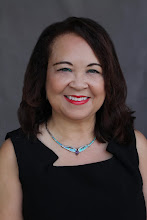
3:17 p.m. Today's project was to finally connect with my prayer partner, whose time has been completely taken up with chemotherapy, physical therapy, and chiropractic treatments for the cancer that was removed earlier this year. We communicate by text and Facebook, and she leaves very encouraging notes for her scores of friends, full of hopeful, powerful scriptures that God is using in her life right now. Because of her weakened immune system, she has had to miss church and Bible study, so many of us send and post verses for her mental, emotional, and spiritual healing. Most important, she also has a wonderful husband, daughter and extended family to support her!
My sweet friend is very much in need of companionship, because the enemy does jump in with fear tactics when she's alone. Now, with her serious hair loss, there's a need for close friends to be with her for an experience she labels "traumatizing," as others can verify. A woman's hair is known as her "crowning glory," and it has been so much a part of our feminine identification through the centuries! "Braided" and "plaited" hair are are seen as adornments in I Timothy and I Peter, even as women are warned against putting their focus on elaborate outward stylishness. But Paul, in a discussion of order in the church and prayer, contrasts the man and the woman:
Does not even nature itself tell you that if a man has long hair, it is a dishonor to him? But if a woman has long hair, it is a glory to her; for her hair is given to her for a covering.
So for a woman to lose her hair is a very hard shocking thing to bear, and much moral support is needed! I will be honored to stay with my friend next Tuesday, a good day for me because I already have a caregiver scheduled then. May our day be uplifting, fun, and funny, a couple of crackpot cancer survivors enjoying the Lord together!
Last week, I realized the need for another kind of connection, namely an Alzheimer's caregiver support group. The Lord showed me that even if I did a multiple things, like Bible teaching ministry and holding public office while raising five children, I now lack the strong leadership that made it all possible. I had a husband in the sense of decision maker and provider, someone to lean on in trials and difficulties that arise in every family. I still confide in Steve, but he is unable to retain the information or grasp the emotional component of my words or body language, and some times just looks at me when I'm in tears. It's not his fault, because the disease has robbed him of comprehending of the seriousness of given situations, and he has no clue of the devastating future impact on me or him of events that take place. And of course, he cannot take charge of problem solving like most husbands would, making things right, standing up for his wife. Even the most serious conversations leave no impact on him. Wish I could just "float above" the crises instead of being the human being responsible to confront and solve them!
There is no doubt that the Lord is more active in my live and decision-making than ever before. The Holy Spirit gives me solutions for a myriad of issues every day. But God created people to be together in community, to assist one another practically and emotionally. "Bear one another's burdens and so fulfill the law of Christ," Galatians 6:2 says. What is Christ's law? In John 15:12 Jesus tells us: "This is my commandment, that you love one another as I have loved you."
One creation the Lord has gifted people with to bless their community is commonality. People going through, or having gone through, the same experiences can be of invaluable service to others who are struggling. For example, I was able to give my prayer partner some advice to reduce swelling in her arm, because I had dealt with it after my breast cancer surgery 7 years ago.
Now I need help in coping with the mental instability of my husband from more experienced family caregivers, because the random trials of life hit me very hard when stress and strain are already high. [I could call upon our adult kids, who commiserate and help out when they can, but they are young adults, with life experiences and wisdom just now forming.] In the mid-stage of Alzheimer's, Steve is very functional in most ways except for confusion, forgetfulness and slow processing of information. Even with professional trained caregivers who will continue to come in to assist me, there is no way to get through the later stages without wise and experienced, likeminded support!
I had been referred by the Alzheimer's Association to the Janet Goeske Senior Center for a caregivers' support group, but it turns out that the center only played host to the Alzheimer's Association group. So today, I called again, and the Goeske Center gave me the Home Instead company.They recommended a caregivers' group in Rubidoux and the Riverside Medical Center on Lakeview Drive. I think that's by Ina Arbuckle where I used to teach.
One would think that with Alzheimer's becoming so rampant as our population ages, groups would be springing up everywhere. But it is less compelling of a need than alcohol/drug or anger management groups that are court-ordered to keep offenders out of jail and protect society. An Alzheimer's caregiver may be despairing at times, or the sufferer may wander off, but harm to the public is pretty rare. I am grateful for caring professionals and trained volunteers who take on the facilitation of what must be very emotional discussions!
Lord, please help Your people connect, support, and love one another, as You have loved us!



No comments:
Post a Comment